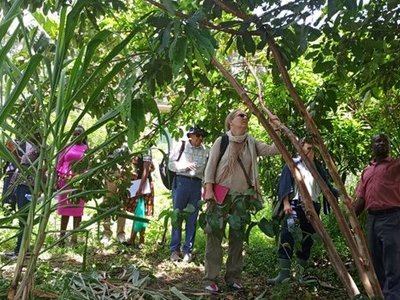

The aim of the AER Phase II project is to strengthen higher education, research and science communication in agroecology in the Rwenzori region. The project is guided by 3 broad outcomes: 1) Improved quality of teaching in MSc. Agroecology taking into account gender diversity, 2) production of high-quality participatory action research, and 3) increased capacity of farmers to actively participate in the development and subsequent adoption of agroecological research innovations.
The main achievements in the second year of the project were the continuation of the practice-based teaching of the Agroecology Masters at MMU and UMU. There are a total of 20 students at MMU and 49 at UMU who are pursuing the Agroecology Masters. To enhance practical oriented teaching at both universities the institutional demonstration gardens have been upgraded with additional livestock, water harvesting systems, solar energy units and a biogas unit at the MMU demo farm. Additionally, the community demonstration unit in Kabarole was equipped with livestock, a solar unit, an energy saving stove and soil and water conservation structures. These demo farms have been increasingly integrated into the day-to-day teaching and learning at the two institutions. Teaching has been supported by regular updating of the e-resources with the latest agro-ecological materials and training of the students in the use of online resources and reference management in learning and research.
In terms of exchange visits, the MMU project team, consisting of 4 people, was able to visit our partners at BOKU for a period of 10 days. While the project funded the travel of 3 persons, additional funding from Erasmus+ Mobility was used to fund the travel of 1 person. The visit took place from 30 May to 11 June 2023. During this exchange programme, the project team had the opportunity to interact with BOKU and the Armenian team, who are also implementing an APPEAR-funded project on the promotion of organic agriculture. The team participated in presentations on interactive learning and integration of ethics in teaching, field trips to different organic farms, e.g. Reinsaat Organic Farm, Grant Organic Farm and a visit to the BOKU demonstration/experimental farm in Großenzersdorf, as well as a visit to the Coordination Office for Gender Equality, Diversity and Accessibility.
The curriculum review process at MMU and UMU started with the development of several monitoring and evaluation tools aimed at several different stakeholders including students, staff, potential employers, and farmers among others. At MMU, these tools were distributed to document the stakeholders views to be incorporated in the revised document. At UMU, the review process was faster and aided by the assessment tool customized from the National Council for Higher Education. In autumn, a two-day workshop was held at MMU to define gender aspects in each of the lectures and be able to take these adjustments into consideration during the review process. Several stakeholder meetings were held with the original members of the Rwenzori Regional Development Framework. The original members are all supportive of the revival of this stakeholder platform.
